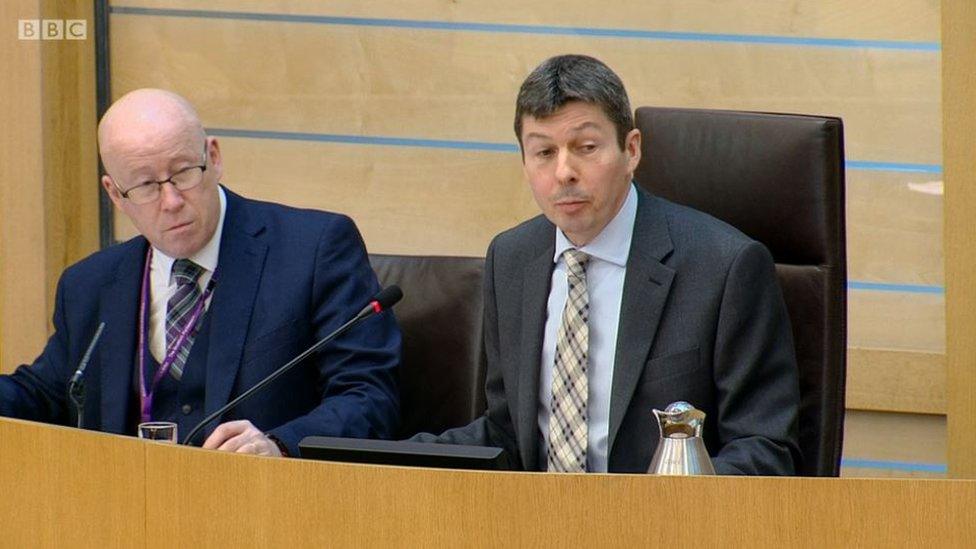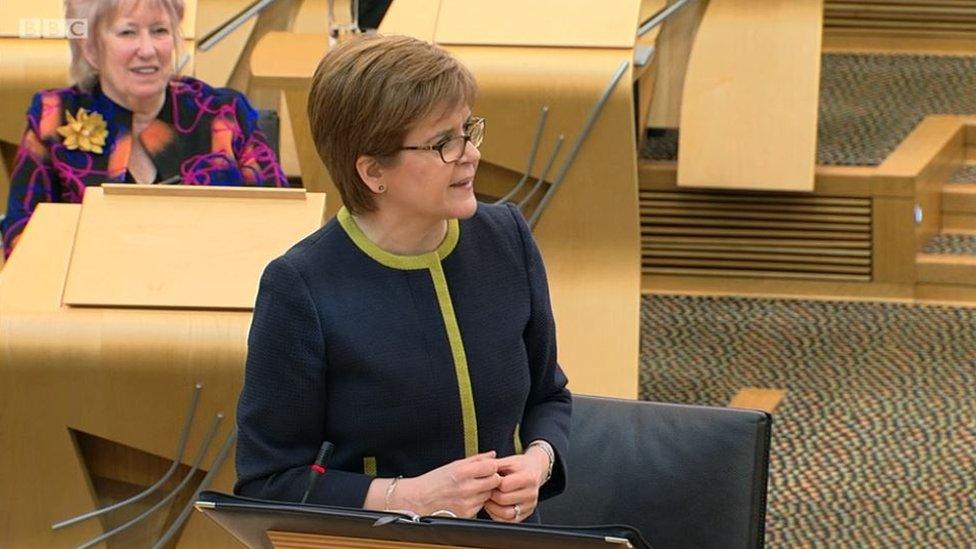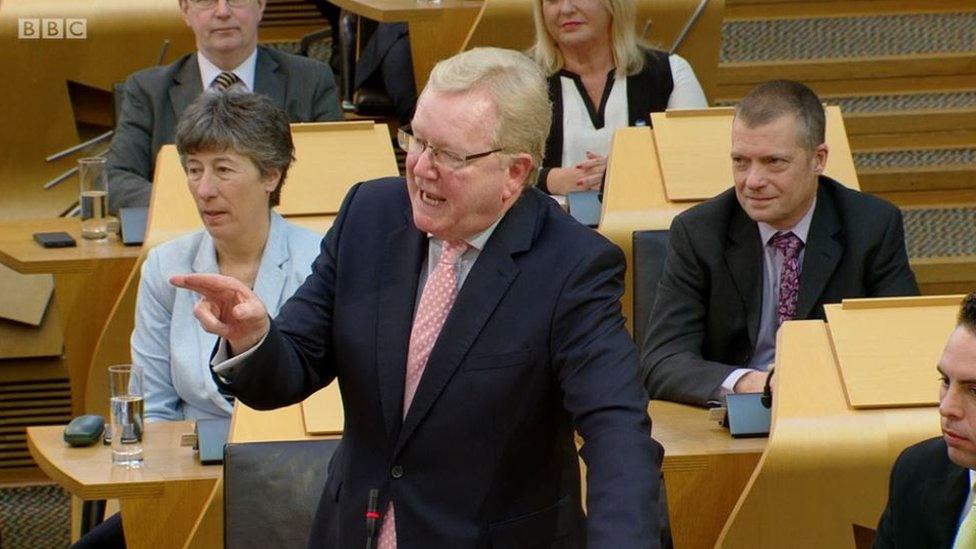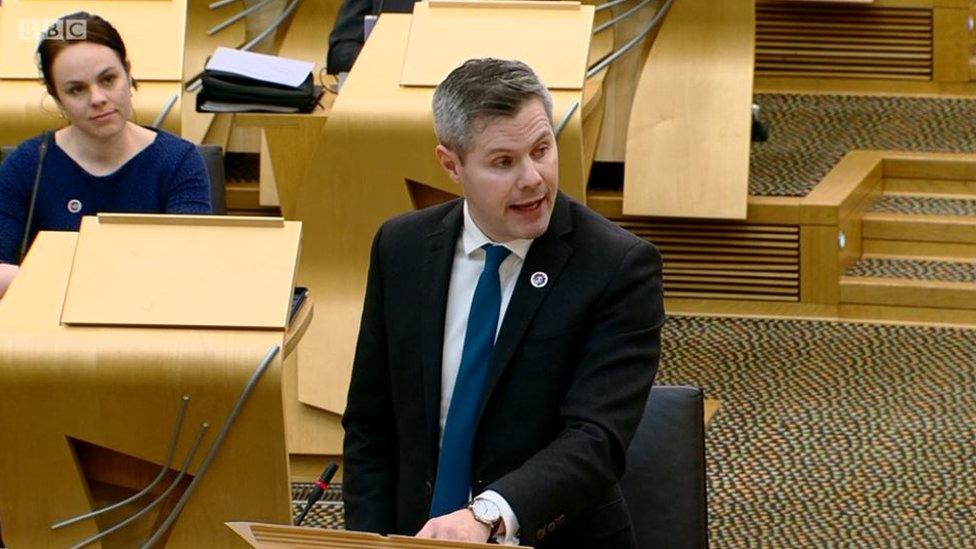Ken Macintosh's inner mischief
- Published

Ken Macintosh has been struggling to inspire brevity from the front benches
The presiding officer, Ken Macintosh, is customarily a gentle individual - except on the football pitch where he is, to put it mildly, somewhat competitive, as I can testify from past encounters.
However, today, at Holyrood, he appeared to rediscover his inner mischief. Firstly, he prefaced questions to the first minister by urging brevity. There have been complaints of front benches hogging the show.
Mr Macintosh then grinned and added: "With that said, I call Jackson Carlaw". The Tory interim leader, in droll mood himself, thanked the PO for his "long introduction".
To this observer, questions proceeded much as they usually do. Indeed, the exchanges involving Mr Carlaw and the government were identical, in many respects, to last week.
With one difference. Seven days ago, it was John Swinney volubly arguing for localism in seeking to defend the possibility of a workplace levy on parking.
This week, the boss was back from her travels; the USA, Canada and France. Questioned earnestly by SNP backbencher Kenny Gibson, Nicola Sturgeon said her sojourn had been entirely to promote Scottish interests, trading and otherwise.
Talk in the wicked media of a jolly was misplaced. To illustrate the point, she listed the extensive travels of the Scottish Secretary David Mundell, praising their merit while adding caustically that nobody had missed him when he was abroad.

Nicola Sturgeon was back in charge after visits to the US, Canada and France
Challenged by Mr Carlaw, she echoed Mr Swinney in promoting localism. And, as with her deputy, she sidestepped the tricky question of whether the policy itself was sensible (hint: it is a Green Party scheme, and one which makes most ministers squirm).
Perhaps the Tory leader exasperated her by pointing out this seeming disconnect. In any event, she closed with a dismissive reference to "second hand car salesmen", Mr Carlaw's former profession.
The interim Tory chief did not seem best pleased. Some reports suggest that he muttered something along the lines of "at least I had a real job". But no matter.
Richard Leonard, for Labour, said councils were facing damaging cuts. Ms Sturgeon said they were facing no such thing. Mr Leonard was rather effective in exemplifying his claim with examples from SNP authorities. Ms Sturgeon was equally effective in rebutting said claims.

Jackson Carlaw clashed with Nicola Sturgeon about their previous professions
For the Liberal Democrats, Willie Rennie pursued a topic he has made his own; the long delay in some Fatal Accident Inquiries. He spoke, with passion and power, of the anguish thus created for grieving families.
Ms Sturgeon sympathised, while nothing that the desire to accelerate such investigations sometimes clashed with the need for meticulous checks.
Then, it was off to the budget debate, and mischievous Ken was back. The presiding officer is required, in such circumstances, to certify whether the Bill in question falls into a special category and requires a "super majority".
This Bill, he said, did not. He surmised, again with a grin, that the Finance Secretary Derek Mackay would be very relieved to hear that.
Mr Mackay, who is part of a minority government, acknowledged with a wry response that any majority at all would do him.

Derek Mackay was pleased with any kind of majority at all for his budget
This he has obtained by doing a deal with the Greens. They obtained extra dosh for councils plus a longer term deal to reform local authority funding.
Given that agreement, the debate had something of a formulaic feeling to it. However, there were speeches of measurable vim from the back benches, most notably from Labour's Pauline McNeill who spoke movingly about the persistence of poverty in Scotland.
To be fair, Derek Mackay spoke well, particularly when warning about the damage a no deal Brexit could cause, not least to his budget plans which would require to be revisited.
Murdo Fraser was admirably droll and determined, in equal measure. Labour's James Kelly was doggedly opposed. Willie Rennie for the Liberal Democrats argued that the budget lacked ambition. And Patrick Harvie for the Greens defended his deal as promoting the best, balanced interests of Scotland.
From the chair, the PO gazed benignly upon all his charges.